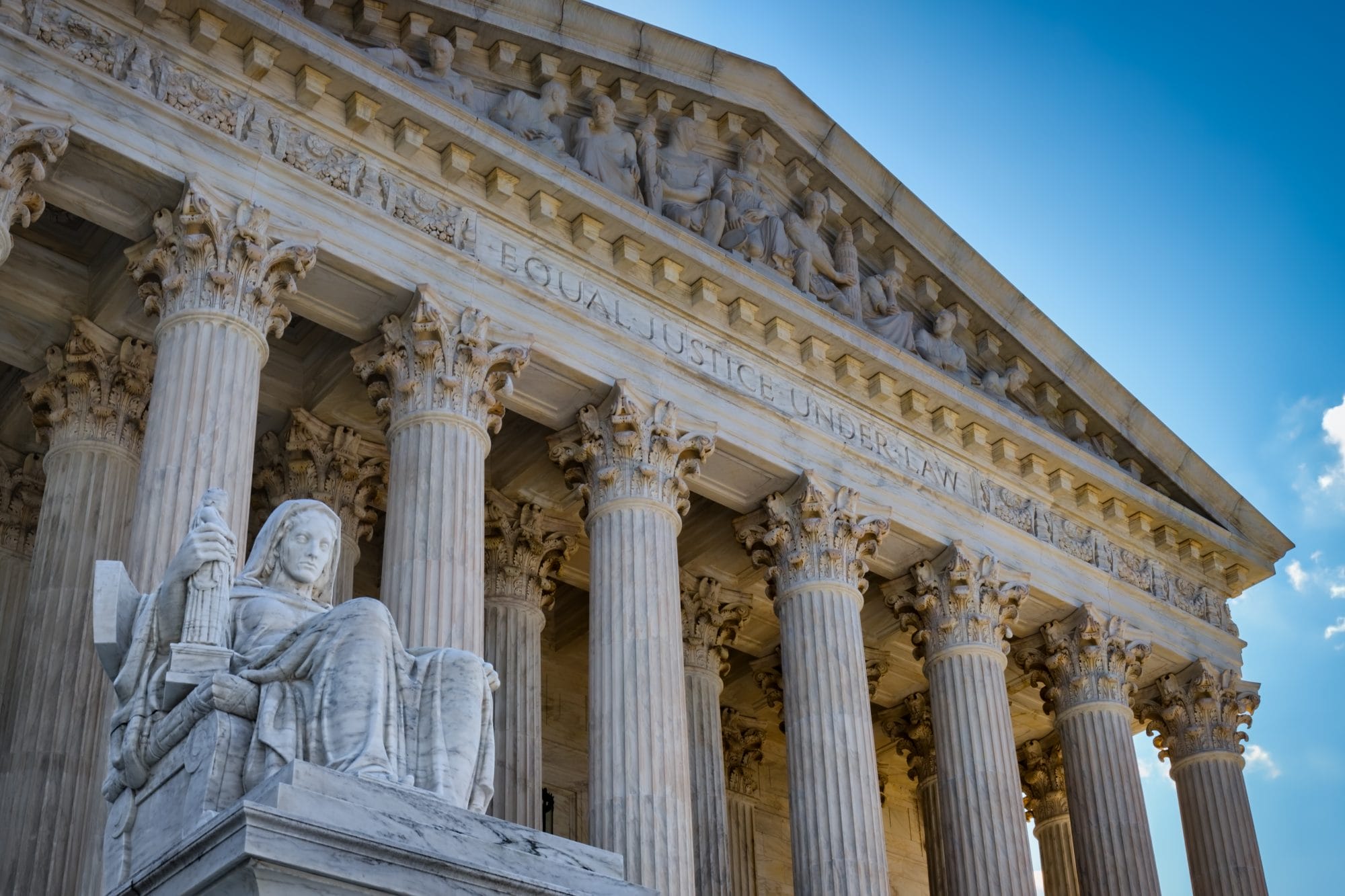A Just & Well-Ordered Society
In previous articles in our Flourishing Series, we covered three domains of flourishing (the Good, the True, and the Prosperous) from Amy L. Sherman’s Agents of Flourishing: Pursuing Shalom in Every Corner of Society. The next domain in our series is the Just and Well-Ordered. Before we explore that domain, let’s take a look back at the key theme of shalom in Sherman’s book as well as six marks that distinguish a flourishing community and an overview of the six domains we can use to measure flourishing in society.
The Longing for Shalom
In the book’s introduction, Sherman draws a connection between our desire and efforts toward community flourishing and the Hebrew concept of shalom:
The Bible teaches that we are made for four foundational relationships: with God, ourselves, others, and the creation itself. The Hebrew word shalom captures the notion of peace in these four relationships. Shalom signifies spiritual, psychological, social, and physical wholeness. And shalom is God’s normative intention for us. Shalom is what we find in his original creation, and shalom is what will characterize the new heaven and new earth in his consummated kingdom. Put another way, God designed us for flourishing. This is because, as Art Lindsey has said, flourishing is simply “shalom in every direction, personal and public.”
Six Marks, Six Endowments
What marks distinguish biblical flourishing in communities? Sherman offers six marks: communion with God, beauty and creativity, learning and discovery, wholeness, unity in diversity, and prosperity and abundance. From these six marks, Sherman utilizes the Human Ecology Framework developed by the Thriving Cities Group at the University of Virginia to name six endowments that are fundamental areas of community flourishing.

These six endowments (or domains) are the most recognizable understandings of human experience and thriving we can use to measure whether a community is truly flourishing. “Like a mosaic, the endowments are fragments of a broader picture that help to frame a community or city in a holistic light.” In building a flourishing community, these endowments act as six interactive and evolving formative contexts in which individuals, groups, and whole communities can experience more of the flourishing they were made for.
The Just & Well-Ordered
In defining the domain of the Just and Well-Ordered, Sherman writes:
A community will not genuinely flourish without a sense of public safety, equitable policies, avenues for peaceful conflict resolution, and fair due process in the legal system (instead of arbitrary or discriminatory treatment). A community moving toward greater thriving is a community with decreasing oppression, violence, fraud, corruption, segregation, discrimination, and dehumanization. A community progressing toward genuine flourishing is one where people have equal opportunities, disputes are settled nonviolently, laws protect people from harm, and trust among diverse individuals and trust between neighborhoods and law enforcement is growing. It is marked by active and respectful political participation, by nonprofit organizations seeking to invigorate civic life, by community organizing, and by all citizens having opportunities to have a voice.
Shared Power & Purpose
What does the Bible say about the domain of the Just and Well-Ordered? A lot, in fact. According to Sherman, the overarching principle in what Scripture has to say about the Just and Well-Ordered has to do with the right use of power (the Power Principle). God the Creator rules his creation with sovereign power. He is all-powerful, but he is also good and always rules in such a way that demonstrates his righteousness and desire for humanity to experience life as it was meant to be lived (i.e., under his loving and sovereign authority). God’s sovereignty and goodness are intertwined. If God were sovereign but not good, he would be a tyrant. If he was good but not sovereign, he would not be able to administer justice righteously.
God has, by design, decided to share power with humanity, giving men and women the command, opportunity, and capacity to partner with him in using their power with the ultimate end being flourishing. This shared power is captured in God’s first command to Adam and Eve in the Garden (Genesis 1:28). In essence, God created image bearers who would rule and subdue the earth on his behalf as his representatives. Humanity’s goal was to exercise power in such a way that it reflected God’s love, goodness, and righteousness.

Eight Expressions
What does the right use of power look like in politics and civic life? Sherman identifies eight expressions from Scripture that give a more robust picture for us. They include:
- Honoring the sanctity of human life. “In the human community as God desires it, every person’s fundamental dignity is honored. A society that denies the humanity of certain groups of people is by definition a deformed version of society.” It is clear that the primary expression of this includes the unborn, given that they also bear God’s image and are, by definition, the most vulnerable in society.
- Practicing fairness. “Since each person has equal worth, each is due equal treatment.” Every human being has fundamental human rights which they are due, “whether punishment or protection or care.”
- Solidarity with the vulnerable. “Since God is committed to the flourishing of every person, he instructed his people Israel to pay special attention to ‘the quartet of the vulnerable’: widows, orphans, aliens, and the poor.” As God is a protector and defender of the vulnerable in society, we, as his image bearers, should be as well. Power should never be used to exploit or oppress the weak. See Deuteronomy 10:18, 27:19 and Ps. 82:3-4.
- Just generosity. “God desires not only that we do not harm others but that we proactively seek their good, particularly the good of the poor. Notably, God commands generosity as a matter of justice, not mere charity. […] Despite humankind’s efforts to draw a line between justice as legal fairness and sharing as charity, Scripture contends that generosity is a matter of justice because of the rightful claims the needy have on those with resources.” See Deuteronomy 24:19-21 and the gleaning regulations given to the Israelites.
- Our brother’s keeper. “A closely related feature of civic life as God seems to desire it is this: he wants community members to embrace a sense of responsibility for one another.” The idea behind this expression is that communal flourishing is interdependent; our flourishing is linked with the flourishing of others. This was lived out by the early church in Acts 2.
- Right ordering of relationships, personal and institutional. “Justice is about fulfilling the obligations of particular relationships. Shalom [or wholeness in relationships] results when these relational obligations are fulfilled.” Personal relationships cited in God’s law include but are not limited to “commercial contracts, lender-debtor arrangements, and employer-employee relations.” Examples of institutional relationships include “families, churches, businesses, government bodies, neighborhood associations, schools, and judicial systems, among others.”
- Diversity in community. “God is beyond all our best attempts at fully comprehending him. No wonder that when he chose to put his image in men and women, he created an endless diversity among them. There is no way that just one culture or color or gender or ethnicity could ever capture the manifold, multifaceted glory of God. God created diversity because only diversity could reflect who he is.”
- Restorative justice. “God’s vision involves not just punishing wrongdoing (presumably as a deterrent against future bad action by the offender) but repairing the harm done and to the extent possible restoring the relationship—and even the offender. See Exodus 21-22.
Christianity & Western Thought
The far-reaching influence of Christianity on Western civilization and its understanding of a just and well-ordered society cannot be overstated. In Dominion: The Making of the Western Mind, author Tom Holland recalls realizing that the moral axioms he took for granted about human dignity, justice, and how to properly order society were profoundly impacted by a Christian view of the world.
The more years I spent immersed in the study of classical antiquity, so the more alien I increasingly found it. The values of Leonidas, whose people had practised a peculiarly murderous form of eugenics and trained their young to kill uppity Untermenschen by night, were nothing that I recognised as my own; nor were those of Caesar, who was reported to have killed a million Gauls, and enslaved a million more. It was not just the extremes of callousness that unsettled me, but the complete lack of any sense that the poor or the weak might have the slightest intrinsic value. Why did I find this disturbing? Because, in my morals and ethics, I was not a Spartan or a Roman at all. That my belief in God had faded over the course of my teenage years did not mean that I had ceased to be Christian. For a millennium and more, the civilisation into which I was born was Christendom. Assumptions that I had grown up with — about how a society should be properly organised, and the principles that it should uphold — were not bred of classical antiquity, still less of ‘human nature’, but very distinctively of that civilisation’s Christian past. So profound has been the impact of Christianity on the development of Western civilisation that is has come to be hidden from view. It is the incomplete revolutions which are remembered; the fate of those which triumph is to be taken for granted.
Concepts like inherent human dignity, universal human rights, and the equality of every individual are not rooted in the Enlightenment or the Greek philosophers. They were drawn from the deep well of God’s truth and wisdom found in Scripture. God has revealed the guiding principles by which a just and well-ordered society should operate. Certain ideas and norms may seem obvious to us now, but in the past, they were anything but obvious. We would be wise to see that God’s Word presents a structure and ethic for creating a just and well-ordered society.
Three Core Ideas
Sherman cites three revolutionary core ideas that have contributed to our view of the just and well-ordered today. First, let’s explore three core ideas. The first has to do with the imago Dei and equality. Sherman writes, “The early Christians’ embrace of the doctrine of imago Dei and the proposition that in Christ there are ‘no Greek or Jew, slave or free’ meant that a countercultural ethic of equality marked their fellowship. […] Equality, for [church father Lactantius], was rooted in the equal human dignity of all persons regardless of social class. Lactantius desired to shape in Constantine a Christian conscience that would attend to the plight of the poor and powerless by establishing protections for them from the exploitation of the wealthy.”
The second core idea concerns the rule of law. “The Christian faith acknowledges just limits on state power. While Romans 13 enjoins believers to obey the governing authorities, it also indicates that such authorities are meant by God to uphold the right and punish the wrong. When a governing authority’s actions do the opposite, contravening God’s moral law […], Christ followers must obey God, not man.” What the ideas of Christianity did was show that no one is above just laws; the same law is to be applied to all persons regardless of status.
The third core idea relates to restorative justice. Rather than focus solely on punishing wrongdoing (i.e., retributive justice), restorative justice is an approach that “includes its possibility for new creation: reformed offenders restored to the community where they can deploy their God-given capacity and be contributors. This is not part of the vision of retributive justice that focuses solely on punishment.”
Three Practices
Sherman also cites three practices that have contributed to our view of justice and order. Throughout the centuries, the church has practiced three things that have sought to uphold a just and well-ordered society and avoid deformations of such a society. Those include limiting violence, the Geneva Convention, and prison reform. Regarding limiting violence, “the church played a key role in promoting nonviolent dispute resolution. […] The church advocated alternative means of settling disputes through mechanisms that today we’d call reconciliation conferences or mediation.” The horrors of war and conflict he observed led Swiss believer Henri Dunant, the founder of the Red Cross, to get nations to sign the Geneva Convention that “guaranteed neutrality for medical workers and their equipment and also required that soldiers treat their captured enemies’ wounds or arrange for someone else to do so.” Regarding prison reform, John Wesley and the Methodists were instrumental in “advocating for reforms and mobilizing humanitarian relief in the form of food and blankets” for prisoners. This led to reforms in prisoners receiving more humane treatment and living in humane conditions. It also led to prisoners using their skills and talents to make articles for sale as a way to contribute to society. All of this was done with the belief that prisoners could change, echoing the expression of the kind of restorative justice we find in Scripture.

The Path to Flourishing
Today, there are those who continue to advocate for justice and equality because injustice and inequality are still present in our society. This must be addressed, and the church should lead the way in doing so. In addressing injustice and inequality, we must embrace what we believe to be true about a just and well-ordered society where every man and woman has inherent dignity and rights and receives fair treatment under the law originates in Scripture. The right use of power by human beings must always be with the purpose of imaging God’s love, goodness, and desire for individuals and entire communities to flourish.
We must also remember the past and how the church has been a champion for justice and the rule of law in society. It might have faltered along the way, but its record speaks for itself. It has done more to promote justice and equality for all than any other entity. Simply put, churches have been at the forefront of reform and making our neighborhoods and communities a place where people feel safe, everyone has a voice in different corners of society, and everyone has the opportunity to flourish.
The path to flourishing is one that leads to a just and well-ordered society. When churches work together to advocate for justice and the rule of law, changes and reforms like those the church championed in the past become possible today. Together, we can make a difference as the Body of Christ to use our power and influence for the good and flourishing of our neighbors and community. Together, this is possible, and together, we can build a flourishing community.


